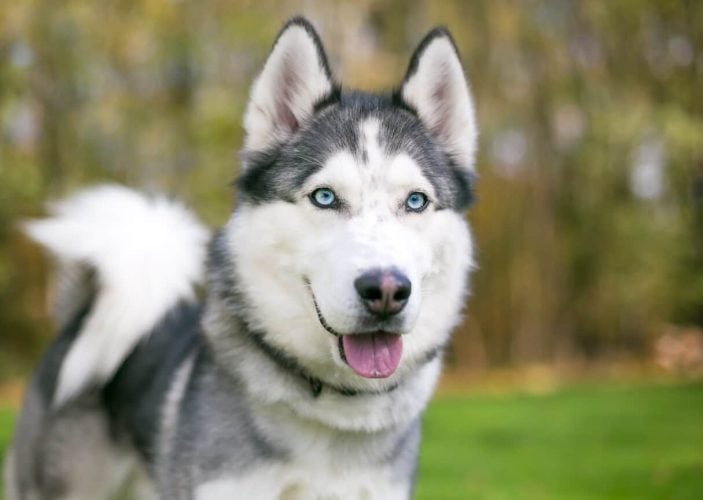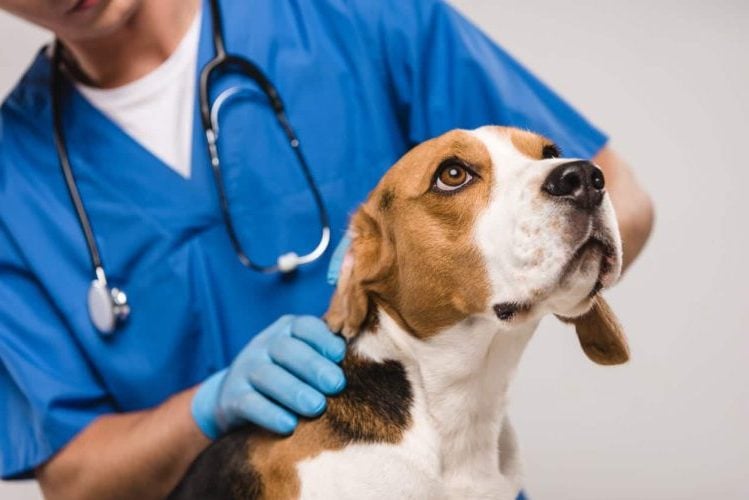- Not a substitute for professional veterinary help.
Hyperthyroidism in dogs is caused by an overproduction of the hormones made by the thyroid gland in the neck. Usually, this health condition develops when a dog has a cancerous thyroid tumor.
While hyperthyroidism can be serious, it’s incredibly rare in dogs, according to Meaghan Thomas, DVM, CVA, a veterinarian at East Ridge Animal Hospital. “When dogs have thyroid problems, it’s usually hypothyroidism,” she says.
Most dog parents don’t need to worry about hyperthyroidism, though it’s fairly common in cats. That said, you’ll want to have your vet check out any unusual lumps or bumps on your pet right away. A lump near your dog’s throat could be a sign of thyroid cancer.
Below, get answers to all your questions about hyperthyroidism in dogs, including the main signs, causes, and how your vet will diagnose and treat the condition.
Symptoms Of Hyperthyroidism In Dogs
“The thyroid is a butterfly-shaped gland on both sides of a dog’s windpipe (trachea). This gland makes thyroid hormones that aid in metabolism and regulation of calcium,” Dr. Thomas explains.
If your dog has hyperthyroidism, their thyroid gland is overstimulated to the point where it produces too much of two different hormones: triiodothyronine (T3) and thyroxine (T4).
These hormones help regulate weight, energy levels, metabolism, internal temperature, and more. But an excess of these hormones can raise levels of calcium in your dog’s body, speed up natural body processes, and boost their metabolism.
As a result, hyperthyroidism in dogs can cause:
- Weight loss
- Increased appetite
- Difficulty swallowing
- Lethargy or decreased energy
- Unusual excitability
- Increased thirst
- More frequent urination
- Vomiting
- Diarrhea
- Increased heart rate
What Causes Hyperthyroidism In Dogs?
In most cases, hyperthyroidism in dogs is caused by thyroid carcinoma, which is a cancerous tumor.
Thyroid cancer typically causes small growths within the thyroid. But your dog can also develop growths in the same area that aren’t cancerous. Keep in mind, though, that thyroid tumors are fairly uncommon, as a general rule: About 1.2% of all canine tumors occur in the thyroid, and not all of these are cancerous.
Less commonly, hyperthyroidism can have other causes, including:
- Benign masses: Noncancerous growths in the thyroid may also cause hyperthyroidism, though this is fairly rare. Most thyroid tumors do not cause an increase in the release of hormones, Dr. Thomas says, so a thyroid tumor doesn’t always equal hyperthyroidism.
- Raw food diets: Some research has linked raw food diets, especially diets that include turkey and chicken necks or beef gullet, to hyperthyroidism. These meat parts may contain parts of the thyroid gland.
- Medications to treat hypothyroidism: If your dog has hypothyroidism, your vet may prescribe synthetic thyroid hormones. Taking too much of this medication may cause hyperthyroidism, so they’ll likely recommend regular monitoring of your dog’s thyroid levels to find the most effective dose.
Does catching hyperthyroidism early make a difference?
“Because the condition is rare and each dog presents differently, I wouldn’t necessarily say that there were clinical signs that arise sooner than others,” Dr. Thomas says. She adds that the early stages usually cause no obvious symptoms.
In short, it’s not always possible to detect this condition early.
That said, Dr. Thomas emphasizes the importance of seeking vet care right away if you notice any changes in your dog’s routine, behavior, or appetite. “Many conditions can be slowed with early intervention,” she says.
Catching a tumor early, for instance, means your vet can treat it promptly with surgery or medication, which may improve treatment outcomes for your dog.
Are Any Particular Breeds at Risk of Thyroid Cancer?
Again, hyperthyroidism is rare in dogs overall, but some dogs have a higher risk of thyroid cancer than others.
According to one 10-year study that considered 638 cases of canine thyroid cancer:
- Older, large-breed dogs had 1.1% of all cancer cases.
- Golden Retrievers, Beagles, and Siberian Huskies have a greater risk of thyroid cancer than other breeds.
- Dogs between the ages of 10 and 15 have a higher risk than younger dogs.
How Do Vets Diagnose Hyperthyroidism in Dogs?
To diagnose hyperthyroidism in dogs, your vet may do a physical exam to check for tumors and order a blood test to check your dog’s hormone levels.
Your vet can order a test that specifically tests for T4, one of the thyroid hormones, according to Dr. Thomas. If your dog’s test comes back with inconclusive results, or they show signs of illness, your vet may recommend other tests.
If the test results do point to hyperthyroidism, your vet may order a thyroid scan to determine if any nodules are producing thyroid hormones. If your dog has a mass, they’ll recommend a biopsy.
What Are The Treatments For Hyperthyroidism?
If your dog has a cancerous thyroid tumor, your vet may recommend:
- Surgery to remove the tumor
- Radioactive iodine to destroy the cancerous thyroid cells
- Radiation therapy to slow and prevent the growth of cancerous cells
The type of treatment your vet recommends may depend on the size of the tumor, your dog’s health overall, and whether the cancer has spread to other tissues of the body.
Dr. Thomas encourages discussing these options with a specialist, since they can offer more information about each treatment, including their risks and benefits.
Medications like methimazole can also help address hyperthyroidism symptoms, but they don’t treat tumors.
What’s The Outlook For A Dog With Thyroid Cancer?
Without a doubt, cancer is a scary disease to face with your dog. But remember, there’s always hope.
Many dogs live for several years after a thyroid cancer diagnosis, and early treatment can improve your dog’s outlook. That’s why it’s so important to schedule regular checkups and let your vet know about any concerns or changes you’ve noticed in their health.




